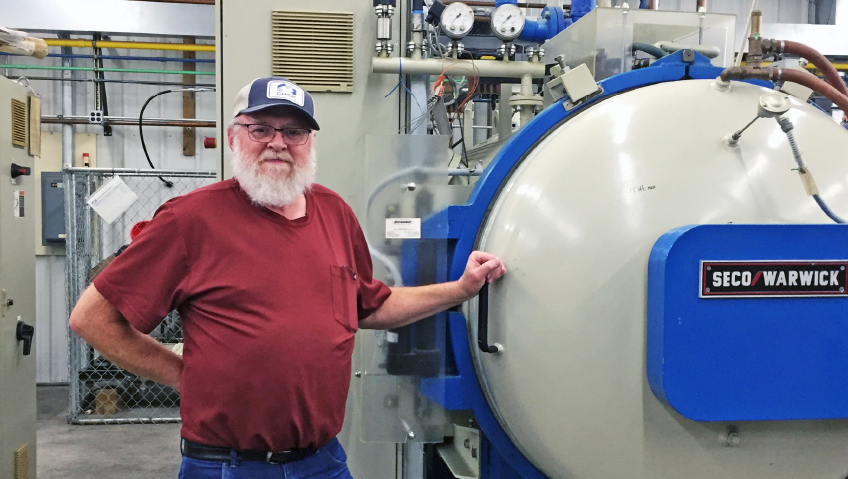Chick Machine Company is celebrating its 52nd anniversary as one of Pennsylvania’s most well-known and reliable machine shops. The company’s story began in August 1971, with its namesake Jim Chick realizing his vision on roughly 300 acres near the city of Butler, part of rural western Pennsylvania. The business was an idea Chick had after he left a machining position in the area to pursue his fortunes. This decision coincided with a business venture by friends of his, who had just started a local precision laser company, now a multi-billion-dollar outfit in nearby Saxonburg.
Chick began making components, such as mirrors machined out of oxygen-free copper, for his friends’ company’s products. These were then used in operations like industrial lasers and became the shared legacy of both companies. From there, Chick Machine Company continued decades of growth through to 2017, when President Bob Petrini purchased the business from Chick. Today, he aims to honor the company’s ever-growing legacy while bringing it into the future.
Bob Petrini says that the company’s key internal focuses are its team, equipment, software, and overall process. “We’re always looking to understand gaps in each category and what we need to do… to continue adding value and improve the company,” he says.
Bobby Petrini, Head of Customer-Supplier Partnerships, says that many upgrades and improvements have been implemented since the company’s purchase six years ago.
At that time, the team first installed an enterprise resource planning system, taking the company from a homegrown access database it had outgrown into a system that could track jobs, inventory, financials, and attendance, managing the entire business with one software package. HighQA was also installed recently, which is a database and application that allows for the managing of all features and measurements of the parts the business makes, separated by part and by job. The software records this data to keep track of every part in fine detail, which also serves to show customers that parts are conforming. Bob Petrini says the process is far more sophisticated, formalized, and automated than the paper reports of the past, and even more advanced than only a few years ago, with continuous improvement being the goal.
Bobby Petrini cites more programs that are bringing the company further into the future. On the tooling and setup side, Chick Machine Company has invested in Zoller tool management software, with hopes to launch it as soon as Q4 2023. This software will add to the different solutions internally that will augment processes and increase speed and repeatability for job setups. As well, the machine shop uses computer-assisted manufacturing (CAM) software in its operations; previously, it had used six different CAM software packages which hindered the collaboration process, so the shop is, as of 2019, standardized under the Mastercam application so that everyone in the team effectively speaks the same language, making collaboration more effective.
The company aims to double the business every five years, and this goal was met recently. Bob Petrini says that the company is fortunate to serve the industrial laser market, which is still a strong part of its portfolio today, along with work in the defense and space markets.
Chick Machine Company has been “fortunate enough to carve out a spot for [itself], which has led to growth over the past couple of years,” he says. Post-COVID, the business has seen 30 percent year-on-year growth, thanks in part to incorporating more automation.
Indeed, automation is quickly becoming a greater part of the company’s processes, and the team has been working to purchase more machines as it continues growing, with every new purchase typically being automated and robot-loaded, including multi-tasking CNC mill and turn machines, automatic pallet loaded horizontal machining cells, and auto-loaded five-axis mills.
With autoloaders, uptime across a 24-hour cycle can be more than doubled, which increases output per square foot and supports growth. All these newer machines can run continuously, unattended for the bulk of the time. A single shift of eight to ten hours of manned time is usually all that is required.
Bob Petrini says that the company is fortunate to have great people on its team, especially in such a talent-rich region of the country for CNC and metrology. Without attracting the talent that Chick Machine has, the machines, equipment, and software are useless. Teamwork, he says, is the lifeblood of the business, and the only way to earn long-term jobs is to consistently deliver and continually earn trust, which requires a strong team.
The company’s markets have been growing for decades, leading to marked growth in the last couple of years, which Petrini attributes to the team. Now, the process of bringing a new worker on board is far more selective, as management must assess if someone can both make an impact on their work and be a good cultural fit.
Within the CNC machining industry in the United States, the work is often versatile enough to serve any market and provide positive momentum, provided a business is positioned in a strong market and can perform. Bob Petrini says increased American demand, a robust pipeline of upcoming projects, and good opportunities to court new business are making this an exciting time for growth in the CNC machining industry.
The incoming year will see Chick Machine Company focus on the aerospace/space markets and capitalizing on opportunities. Looking ahead further, Bob Petrini says that the business will be looking for work in the medical field to broaden its horizons even further.
Chick Machine Company will continue investing in automation whenever possible, a tactic which has proven beneficial thus far. The company will also look to better understand the skill sets required to satisfy the evolving market and ensure it has those needs met going forward; for example, within the last six years, the company has hired for positions in sales, engineering, quality management, and finance.
Throughout his experience at Chick Machine—from being an employee for the better part of 40 years to becoming President—Bob Petrini always had a dream of controlling his destiny, a dream realized in 2017 when he and Bobby took the reins of the business. Today, he finds it fun and rewarding to run the company with a minimal amount of red tape getting in the way of operations.
“It’s a small, nimble business that gets a lot done in a short period,” he says. And for him and his team, it feels good coming to work every day.






